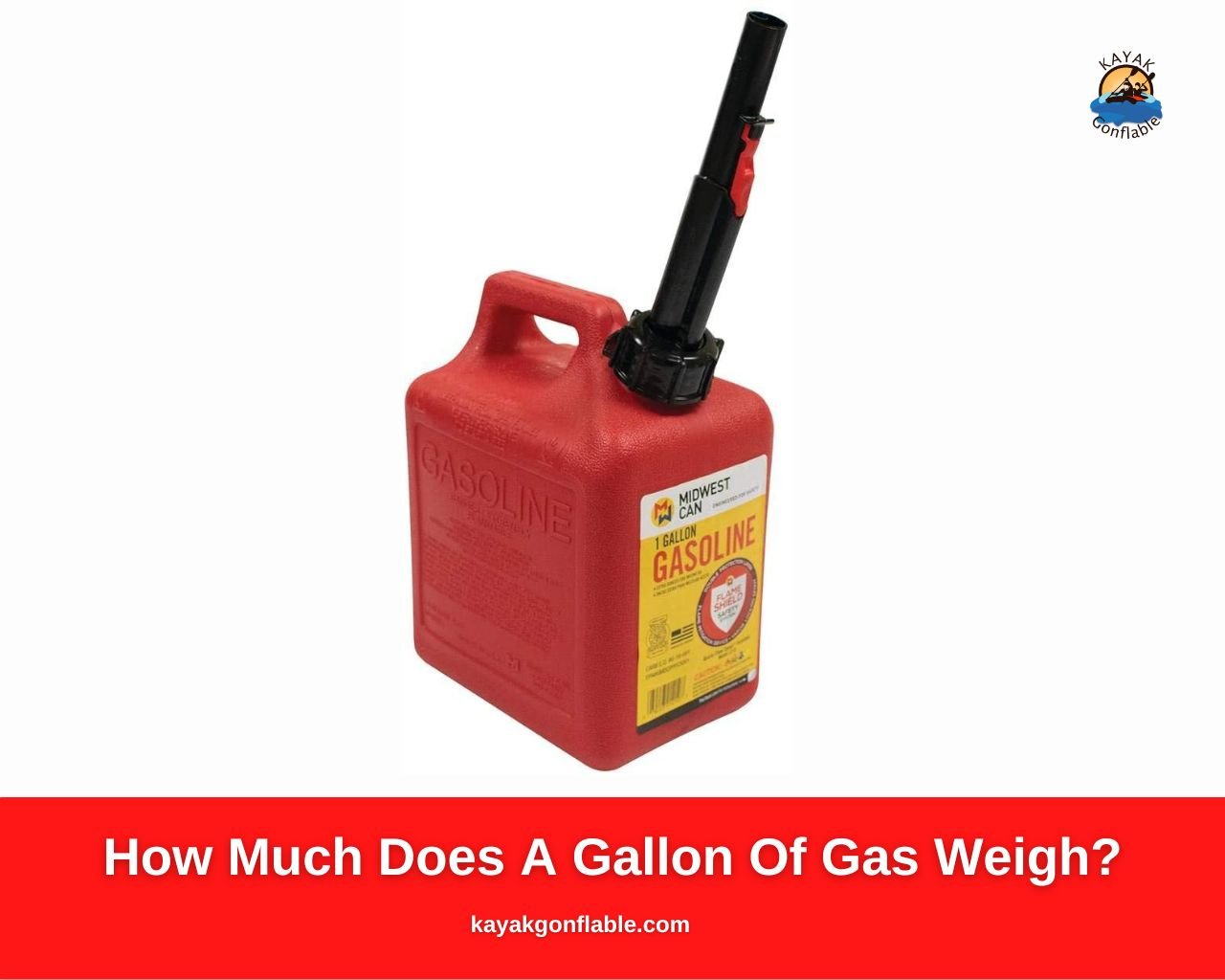How Much Does A Gallon Of Gas Weigh

When you fill-up your tank with gasoline, the weight of that gallon is important to know. How much does a gallon of gas weigh? Surprisingly, the answer to this question is not as straightforward as one might think.
Depending on the type of gas and the country in which it was manufactured, a gallon of gasoline can weigh anywhere from 4.2 to 7.5 pounds.
So when you’re pulling up to the pump and wondering how much it’s going to cost you, you can also think about how much that gallon of gas is going to weigh down your car and what is in gasoline that weighs down your car.
Components Of Gasoline And Their Weights
Gasoline is a liquid that is used to power cars. It is usually vaporized and used as a fuel in internal combustion engines.
It is made up of many different chemicals, including octane, which helps it to ignite and burn in the engine. Gasoline is classified into several grades, the higher the octane number the higher the quality of the gasoline.
Gasoline also contains other chemicals that are used to clean the engine and keep it running smoothly. The most common gasoline blend contains about 10% ethanol. The weight of gasoline varies depending on the type of fuel used.
Gasoline is composed of many different hydrocarbons, but the most important ones for determining its properties are octane, heptane, and benzene.
The density and weight of a fuel affect its performance in an engine. For example, a fuel with a greater weight will be harder to start and will have less power than a fuel with a lesser weight.
Gasoline is a mixture of hydrocarbons, and it’s the vapors of this liquid that are used in internal combustion engines.
The most important component of gasoline is octane, which helps the fuel resist “knocking” or “pinging” during combustion and allows the engine to run efficiently. Gasoline also contains other chemicals like sulfur, lead, and aromatics (compounds with a strong smell).
The weight and density of gasoline can vary depending on the type of fuel. For example, regular unleaded gasoline typically has a weight of 6.7 pounds per gallon and a density of .72 grams per cubic centimeter.
The density of gasoline is about 0.7 grams per milliliter. This means that 1 liter of gasoline weighs 700 grams or about 1 1/2 pounds. By comparison, diesel fuel has a weight of 8 pounds per gallon and a density of .80 grams per cubic centimeter.
Factors That Affect The Weight Of A Gallon Of Gasoline
The weight of a gallon is determined by a number of factors, including the density of the fuel and the ambient temperature. In general, gasoline is less dense than water, so it takes up more space.
The higher the ambient temperature, the less dense the gasoline will be. This is because warmer air can hold more moisture than cooler air, and water vapor takes up space in the fuel tank.
The weight of a gallon also depends on the type of fuel. Some fuels are denser than others. We take a look at some of the factors that affect the weight of gasoline:
Location
The weight of a gallon of gasoline is not consistent throughout the United States. The weight of a gallon of gasoline can vary depending on the location.
The weight of a gallon of gasoline in New York will be different from the weight of a gallon of gasoline in California. This is because the density of gasoline changes with climate and altitude.
The higher the altitude, the less dense the gasoline will be. This is because air pressure decreases as altitude increases. The lower the air pressure, the less dense the gas will be.
The temperature also affects the density of gasoline. Gasoline is denser when it is colder. For example, in California, a gallon of gasoline weighs about 6 pounds, while in Texas, it weighs about 5.5 pounds. This is because the density of gasoline varies depending on the altitude and climate.
Additives
Gasoline is a volatile, flammable liquid. It is mainly used as a fuel in internal combustion engines. Gasoline varies in weight depending on the additives that are mixed in with it.
The weight of a gallon of gasoline without any additives is about 7 pounds. However, when different additives are mixed in, the weight can increase or decrease.
For example, ethanol is an additive that can be mixed in with gasoline to increase its octane rating. Ethanol weighs less than pure gasoline, so when it is added, the weight of a gallon of gasoline decreases.
Other additives that can be mixed in include MTBE and ETBE. These two chemicals are oxygenates that are added to gasoline to help reduce smog formation.
They both weigh more than ethanol, so the weight of a gallon of gasoline increases when they are added. In rural areas, a gallon of gas may weigh more than in urban areas.
This is due to the fact that there are more additives in gas used in rural areas to prevent moisture build-up and corrosion. These additives make the gas heavier.
Time Of Year
There are many factors that affect the weight of a gallon of gasoline. One of the most important is the time of year. The weight of gasoline changes with the weather. In the summer, it is lighter than in the winter.
This is because the temperature affects how dense the gasoline is. In cold weather, gasoline is denser and therefore weighs more. This means that a gallon of gasoline takes up less space when it is hot than when it is cold.
This difference in weight can be significant. In summer, a gallon of gasoline might weigh only 7 pounds. But in winter, that same gallon could weigh as much as 8 pounds.
This may not seem like a lot, but it can make a big difference at the pump. When prices are based on the weight of fuel, consumers might pay more for gasoline in winter than they would in summer.
Competition
There are many factors that affect the weight of a gallon of gasoline. One of those factors is competition. When there is more competition, the weight of a gallon of gasoline tends to be lower.
This is because the gas stations are competing with each other to get customers. They want to offer the lowest prices possible so that they can attract more customers.
This means that they have to keep their costs down, and one way to do that is by keeping the weight of the gasoline low.
Does The Price Of Gasoline Affect The Weight Of A Gallon?
There is no definitive answer to this question as the relationship between gasoline price and weight is not fully understood. However, there are a few factors that could potentially affect the weight of a gallon of gasoline.
Firstly, when the price of oil increases, the cost of producing gasoline also goes up, which could lead to a decrease in the amount of fuel that is put into each gallon to ensure profitability.
Additionally, when gas prices are high, people may be more likely to purchase fuel-efficient vehicles or choose to walk or bike instead of driving. This could lead to a decrease in the overall weight of gasoline sold.
However, there are also many other factors that could come into play, such as changes in transportation and production costs. As such, it is difficult to say for certain whether or not the price of gasoline affects the weight of a gallon.
How To Calculate The Weight Of A Gallon Of Gas
To estimate the weight of a gallon of gasoline, start by converting gallons to liters. There are 3.785 liters in a gallon.
Next, multiply the number of liters by the weight of a liter of gasoline. Gasoline typically weighs 0.7 grams per liter. This gives you the weight of a gallon of gasoline in grams.
Finally, divide this number by 1,000 to convert it to kilograms. A gallon of gasoline weighs approximately 6.8 kilograms.
How Does The Weight Of Gasoline Affect Its Octane Rating?
The weight of gasoline does not directly affect its octane rating. The octane rating is a measure of the fuel’s ability to resist “knocking” or “pinging” during combustion and is affected by the composition of the fuel, not its weight.
However, the composition of gasoline might affect its weight. Gasoline that contains more than 10% ethanol can have an octane rating of up to 112. Gasoline that contains more than 5% butane can have an octane rating of up to 116.
Gasoline is composed of a blend of different hydrocarbons that are combined to create different octane ratings. The weight of gasoline is affected by the composition of these hydrocarbons.
For example, a blend that has a high percentage of butane will be lighter than one that has a high percentage of heptane. This is because butane has a lower molecular weight than heptane
N-Heptane is the point at which the octane number starts. It burns more rapidly and causes the engine to pre-ignite (knock) in its raw form; its isomers however burn more slowly and give less knocking.
So the weight of gasoline does not directly affect its octane rating, its composition does. The weight of a gallon of gasoline depends on a variety of factors, including the type of fuel and the additives used.
It is important to be aware of these factors when purchasing gasoline so that you can make an informed decision about which type of fuel is best for your vehicle.






